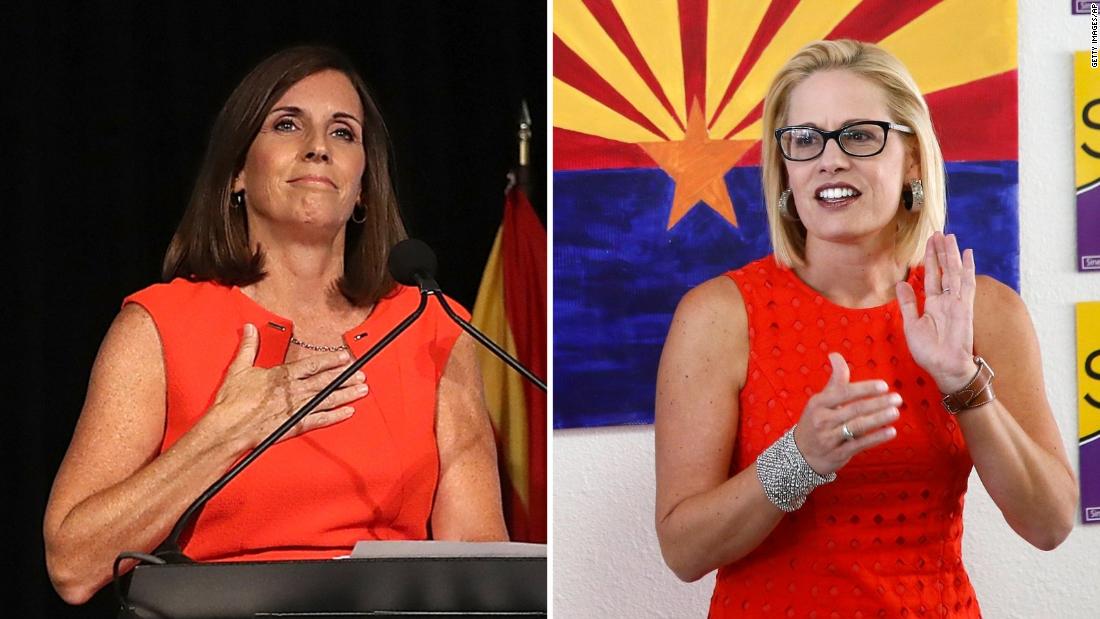
Sinema led by 30,310 votes as of 1 p.m. ET on Sunday, according to the Arizona secretary of state's office. That puts her ahead by 1.4 percentage points with more than 2.1 million ballots counted.
On Saturday, Sinema campaign manager Andrew Piatt continued to express a belief that there are more Democratic ballots left to be counted than Republican ballots.
"McSally can hope for a miracle tomorrow night but the data show it won't happen," he said in a statement.
McSally campaign CEO Jim Bognet offered a drastically different take.
"The latest release provides compelling evidence that the remaining uncounted ballots are favorable to Martha. And we will continue our effort to make sure all lawful ballots are counted," he said in a Saturday statement.
As votes continue being counted, Republicans are divided over how to handle the close election.
Arizona GOP elected officials, including McSally's camp, have defended the lengthy process and said the state must make sure every ballot is counted.
President Donald Trump and the national and state Republican parties, meanwhile, have cast doubt on the election's legitimacy -- even though there are no allegations or evidence to support those claims.
In a shift on Sunday, however, the chairman of the National Republican Senatorial Committee backed away from his own group's fear-mongering about the race's outcome.
Arizona's process of counting votes moves slowly because about 75% of the state's electorate votes by mail. Every one of those ballots goes through a verification process that involves matching voters' signatures on their ballots' envelopes with their voter registration forms.
Elections officials in two densely populated counties typically allow voters up to five days to help "cure" problems when signatures don't match.
Arizona Republicans filed a lawsuit that was quickly resolved with a settlement Friday that required all 15 counties in the state to follow the same procedure as Maricopa and Pima counties.
That seemed to satisfy McSally's camp and Republicans in the state. In a statement, McSally said she'd "won an important battle" to ensure rural voters receive equal treatment.
However, President Donald Trump used reports of the dispute to cast doubt in the fairness of Arizona's election, suggesting there had been "electoral corruption" even though there is no evidence to support Trump's claim.
"Just out — in Arizona, SIGNATURES DON'T MATCH," Trump tweeted Friday. "Electoral corruption - Call for a new Election? We must protect our Democracy!"
Trump was swiftly rebuked by Republicans in the state, including Gov. Doug Ducey, who had just won re-election Tuesday.
"We often hear the phrase: Every vote matters. And the #AZSen race is proof. So let's get this right. All legally cast votes MUST be counted. Lawful votes in EVERY county in the state MUST be counted," Ducey tweeted hours after Trump.
"Let's follow the law, count the votes, prevent any cheating, and heed the will of the voters," Ducey added in a second tweet.
Outgoing Republican Sen. Jeff Flake also criticized Trump on Twitter. "There is no evidence of 'electoral corruption' in Arizona, Mr. President. Thousands of dedicated Arizonans work in a non-partisan fashion every election cycle to ensure that every vote is counted. We appreciate their service," he tweeted.
Arizona's Republican secretary of state, Michele Reagan, has repeatedly tweeted links to a blog post in which she explained why the state's vote-counting procedure moves slowly.
"Arizona takes elections seriously -- from the poll workers to the county elections officials, and the Secretary of State's office and everybody is working diligently to tabulate all of the election results in a manner that Arizonans can be proud of and, most importantly, trust the results," she wrote.
Colorado Sen. Cory Gardner, the chairman of the National Republican Senatorial Committee, cast the GOP's concern about Arizona's handling of ballots as having been resolved by the agreement Friday.
"I believe there's been an agreement amongst the counties with the officials there to count everything the same, to follow the same procedure," Gardner said Sunday on CNN's "State of the Union." "And that's important, because a vote that's cast in Yuma shouldn't be disqualified under the same provision that qualifies a vote in Maricopa."
He added, "I think that's the agreement we reached in Arizona, and I think that's a good outcome."
Gardner's comments came as he defended a statement the NRSC released just a day earlier.
The GOP's official Senate campaign arm, in a news release Saturday, accused Maricopa County's top elections official, Democrat Adrian Fontes, of "using his position to cook the books" for Sinema.
Gardner said Sunday on NBC's "Meet the Press" that "there's a lot of releases that are going to go out that I don't see." He added that he was "not familiar with this one."
He highlighted the Friday agreement to follow the same procedures to match signatures in urban and rural counties.
"I think we're on the right track in Arizona," Gardner said.
Still, some Republicans are eager to aggressively cast doubt on the fairness of an election in which Democrats now lead.
The Arizona Republican Party on Saturday submitted a public records request for all contact between Fontes' office and Sinema's campaign, without offering any evidence of any improper activity.
"He is a liberal activist masquerading as an election official, and we cannot trust him to oversee this process," state GOP Chairman Jonathan Lines said of Fontes.
No comments:
Post a Comment